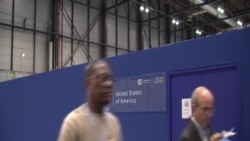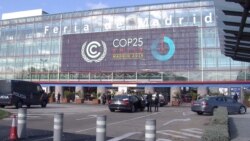MADRID — Tucked amid a maze of blue cubicles at the Madrid climate talks is the official voice of U.S. federal policy on climate change. The Washington delegation is maintaining a discreet public presence at the conference.
But another message is sounding in the cavernous conference center, where representatives of nearly 200 countries are feeling the pressure to deepen their emissions-cutting goals amid a slew of dire climate warnings.
Around the corner from the U.S. delegation office, the prominently located pavilion of the U.S. Climate Action Center is embracing the tagline #WEARESTILLIN — a message scrawled on its tents and echoed by U.S. Democratic House Speaker Nancy Pelosi during a visit here last week.
Even as the Trump administration plans to pull the United States out of the Paris climate agreement next year, a broad coalition of state, local and business leaders is heading in the opposite direction as it endorses the pact's emissions-cutting goals. Together, members say, they represent nearly 70% of the U.S. economy.
Opportunities in going green
"They are seeing opportunities in the clean energy economy and they're acting accordingly," said Mariana Panuncio-Feldman, senior director for international climate cooperation at the World Wildlife Fund. "They see opportunity in job generation. They also see quality-of-life benefits for citizens."
The U.S. government will continue to participate in international climate discussions and "offer a realistic and pragmatic model — backed by a record of real-world results — showing innovation and open markets lead to greater prosperity, fewer emissions and more secure sources of energy," according to a State Department statement.
It noted emissions continued to decline in recent years, even as the U.S. economy grew. A separate study released last week by the Global Carbon Project also found U.S. emissions fell last year, on a par with the European Union.
But a number of state and local leaders are embracing more ambitious goals. More than two dozen U.S. governors are part of a bipartisan climate alliance, with California and New York aspiring to become climate neutral by 2050. Dozens of businesses, universities and cities are also setting emissions-cutting goals.
Together, these and other existing policies could slash greenhouse gas emissions by one-quarter by 2030, compared to 2005 levels — and with stepped-up action, by 37%, according to a report titled "Accelerating America's Pledge," an initiative co-founded by U.S. Democratic presidential candidate, Michael Bloomberg.
"There is a force in the United States that is committed to addressing climate change and addressing the Paris agreement," Panuncio-Feldman said, describing the U.S. government's pullout of the climate pact "a wake-up call."
Going local elsewhere
The climate fight is also going local in other parts of the world, spearheaded by what environmentalists term "subnational actors."
France and a group of Brazilian states are set to announce plans this week to preserve the Amazon rainforest, threatened by forest fires and agricultural expansion, according to Reuters. Such a move would sidestep Brazilian President Jair Bolsonaro's government, which has clashed with Paris over accusations of accelerating deforestation.
"The amazing thing is we see, again and again, that there are businesses, local governments, citizens committed to addressing climate change everywhere," said Panuncio-Feldman. "And they're growing in number and strength."
But, she added, these and other efforts cannot reach the speed and scale of emissions cuts scientists say are needed on their own.
"The United States is needed at the table," she said. "Climate change cannot be solved by one government alone."








